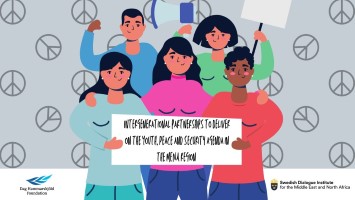On 18 January 2021 the Swedish Dialogue Institute for the Middle East and North Africa co-hosted an online workshop with a focus on intergenerational partnerships and the Youth, Peace and Security (YPS) Agenda.

The workshop, held under the Chatham House Rule, was organised in partnership with the Dag Hammarskjöld Foundation, a Swedish non-governmental organisation established in 1962 in memory of the second UN Secretary-General, which aims to advance dialogue and policy for sustainable development and peace.
Attendees in the virtual workshop included young peacebuilders and leaders of youth-led organisations from across the MENA region, as well as representatives from multilateral and civil society organisations. Participants discussed what is needed to promote inter-generational collaboration and partnerships to deliver on the YPS Agenda in the MENA region.
United Nations Security Council Resolution 2250, adopted in 2015, is generally regarded as a ground-breaking recognition of the importance of youth participation in peacebuilding and sustaining peace. While much has been achieved since the resolution’s adoption, much more is needed to ensure the resolution’s implementation and young people’s meaningful engagement in decision making.
Specifically, young people continue to be engaged by decision makers in a tokenistic manner, often only in order to fill a ‘youth’ seat. They face systemic barriers to participation, including the lack of access to quality education and employment, and operate in contexts where civic space is shrinking.
In addition, given that partnerships form one of the five key pillars of the YPS Agenda, the question of how to frame and define partnerships between generations is critical to fostering learning and exchange from one generation of peacebuilders to the next.
These issues and more were discussed and debated across the three-hour workshop, which also included smaller breakout groups for interactive discussions to foster networking and exchange of ideas on how to build meaningful partnerships and develop recommendations for advancing intergenerational dialogue.
Several key themes emerged. One related to the importance of continuing to provide opportunities for young people and institutional actors to gain a deeper understanding of the YPS Agenda and the concept of youth participation.
A second theme related to the importance of creating platforms that foster dialogue between youth and decision makers. Equal partnerships with youth that aim to listen and learn from their experiences and perspectives are critical to ensuring young people’s meaningful participation in society.
A third theme emerging from the discussions centred on the meaning of terms like ‘peace, ‘peacebuilding’ and ‘dialogue’. The ways in which people conceptualise these terms are as diverse as their experiences. Often, young people in the region have different understandings of these terms than generations before them.
The different meanings that these and other terms hold has been brought up in previous roundtables in which the Foundation has been involved and was the subject of a recent post on the Dag Hammarskjöld Foundation’s blog.
A fourth discussion strand involved the question of connecting the YPS Agenda to other normative frameworks at the national level, and specifically learning from experiences of implementing the Women, Peace and Security Agenda.
This article has been written by David Prater and is cross-posted on the Dag Hammarskjöld Foundation website. A full report from the meeting can be found attached.
